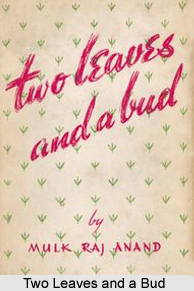 Two leaves and a bud is a heart rendering saga of the laborer, barbarically exploited in the tea plantation and finally killed by the British officer. Every corners of the garden, the two leaves and the bud of the tea trees, the shade shrubs are the silent witnesses of this oppression and agony of the poor Punjabi laborer who stands as the insignia of the oppressed class. With an apt title therefore the novel Two Leaves and a Bud stands as a breathing document of the sufferings of the tea laborers.
Two leaves and a bud is a heart rendering saga of the laborer, barbarically exploited in the tea plantation and finally killed by the British officer. Every corners of the garden, the two leaves and the bud of the tea trees, the shade shrubs are the silent witnesses of this oppression and agony of the poor Punjabi laborer who stands as the insignia of the oppressed class. With an apt title therefore the novel Two Leaves and a Bud stands as a breathing document of the sufferings of the tea laborers.
The Indian novelist Mulk Raj Anand was a great writer with contemporary thought and modernity. Mulk Raj Anand was arguably the greatest exponent of Indian writing in English. His literary output was inculcated with a political commitment that conveyed the lives of India`s poor. Mulk Raj Anand inscribed these in a realistic and sympathetic manner. He had been involved in India`s freedom movement. He was also the co-founder of India`s greatest literary movement in the 1930s. Born into a family of metal workers with an army background in Peshawar, he witnessed the bloody reality of colonial rule with the Jaillinwalla massacre at Amritsar in 1919. This experience of his life has come up in many of his write-ups. Like most Indians of his generation he was also engaged in Gandhi`s non-cooperation movement. This led him into student agitation against the British for which he received 11 stripes on his back and was briefly jailed. After that he left freedom movement and went to London and subsequently started his writing career. Anand was pivotal to internationalising the experience of Indian writers to the outside world. He helped to bring an international dimension to the progressive writers` movement in India. He is brilliant at satirising the dogmatisms and orthodoxies of his times, but his novels always celebrate the spirit of human rebellion which embodies all his central characters. He passed away last September at the age of 98.
Synopsis Two Leaves and a Bud , Mulk Raj Anand:
Written in 1937, `Two Leaves and a Bud` is Mulk Raj Anand`s memorable piece of work.In Two Leaves and a Bud which was published on 1937, Anand continued his exploration of the Indian society. The story told about a poor Punjabi labor. He is brutally exploited in a tea plantation and killed by a British official, who tries to rape his daughter. This novel tries to dramatize the cruelties inherent in the caste system and the suffering induced by poverty as well. This is mainly about the plight of the laborers in a tea plantation in Assam. Here the hero, Gangu, is a person who is a pessimist about his fate, and has to undergo daily insults at the hands of his plantation masters and others. The tea gardens in Assam become a symbol of his slavery. Even the kind British doctor could do little to alleviate his sufferings. The master, Reggie Hunt being an arrogant bully and sadist tries to rape his daughter and the story is about Gangu`s fatal attempt to protect his daughter from being raped by his master. Although the novel fails because of the author`s too simplistic approach and also the picture depicted about the English owners as unmitigated villains.
`Two Leaves and a Bud` is published by the famous publishing house Kutub-Popular of Bombay.
`Two Leaves and a Bud` narrates the tale of a farmer who faces exploitation and death at the hands of a British official. Being a staunch Marxist, Anand never failed in drawing a realistic picture of the poor in India. He always draws the attention regarding the dual problem of a deep-rooted caste system and a dominating colonial empire. And this was aptly captured in his writing.



















